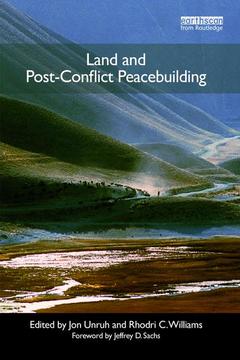Land and Post-Conflict Peacebuilding Post-Conflict Peacebuilding and Natural Resource Management Series
Coordonnateurs : Unruh Jon, Williams Rhodri

Claims to land and territory are often a cause of conflict, and land issues present some of the most contentious problems for post-conflict peacebuilding. Among the land-related problems that emerge during and after conflict are the exploitation of land-based resources in the absence of authority, the disintegration of property rights and institutions, the territorial effect of battlefield gains and losses, and population displacement. In the wake of violent conflict, reconstitution of a viable land-rights system is crucial: an effective post-conflict land policy can foster economic recovery, help restore the rule of law, and strengthen political stability. But the reestablishment of land ownership, land use, and access rights for individuals and communities is often complicated and problematic, and poor land policies can lead to renewed tensions.
In twenty-one chapters by twenty-five authors, this book considers experiences with, and approaches to, post-conflict land issues in seventeen countries and in varied social and geographic settings. Highlighting key concepts that are important for understanding how to address land rights in the wake of armed conflict, the book provides a theoretical and practical framework for policy makers, researchers, practitioners, and students.
Land and Post-Conflict Peacebuilding is part of a global initiative to identify and analyze lessons in post-conflict peacebuilding and natural resource management. The project has generated six edited books of case studies and analyses, with contributions from practitioners, policy makers, and researchers. Other books in the series address high-value resources, water, livelihoods, assessing and restoring resources, and governance.
Date de parution : 08-2017
15.2x22.9 cm
Date de parution : 04-2013
15.2x22.9 cm
Thèmes de Land and Post-Conflict Peacebuilding :
Mots-clés :
pinheiro; principles; administration; iraqi; civil; code; law; property; restitution; legal; Land Administration Domain Model; Abyei Boundaries Commission; Bangsamoro Juridical Entity; Tara Bandu; United Nations University; Ngok Dinka; Lanao Del Norte; Pinheiro Principles; Iraqi Civil Code; South Sudan; Van Der Auweraert; Ancestral Domain; Postconflict Situations; Abyei Area; United Nations Human Settlements Programme; Cadastral Commission; Internally Displaced; Economic Land Concession; Post-conflict Land; Land Administration; Property Restitution; Land Disputes; Post-Conflict Natural Resource Management; Tripoli Agreement; Sudan People’s Liberation Movement



